#stories that question the status quo of “romance above everything else”
Explore tagged Tumblr posts
Text
less "this story has no romance in it" and "this story has aspec characters in it", more "this story is about aromantic people and aromanticism" please and thank you
#i mean there's nothing wrong with the first two options#but i really really want to read aro stories#like stories told from the pov of aro characters#stories about aro characters#stories that question the status quo of “romance above everything else”#and “love above everything else”#bit tired of most recommended "aro stories” actually meaning “romance isn't the focus that's what the aros want right?”#im on my aro bs again can you tell#aromantic#aro#queer stuff
367 notes
·
View notes
Text
Another Top 10 Reasons TF Needs to Change its Status Quo
After making this list, I realised 10 reasons are not enough and that alone is telling. After some thought, I realised there are many reasons though these are the ones that are most important as to why Transformers needs to change its status quo.
1- Proper representation that is respectful and with the times matters. - Did you know that Jazz is so far the only confirmed Transformer of colour and every damn time he is used, he’s a stereotype of a black person? Did you also know that even though everyone knows Knockout from Transformers Prime is gay, the writers denied it by denying that Transformers don’t have genders or orientations even though it has been confirmed that they do since Beast Wars? Also, the first openly “oriental” Transformers are a little ridiculous to look at it. Windblade looks like a geisha girl with hair and make up to match. Then we have Drift who looks and acts like a stereotypical overly stern samurai. And let’s not forget Transformers Animated Ratchet who is another stereotypical old man character who is predictably grouchy, not fun, anti-social, borderline ageist and has PTSD. I hate being politically correct, but as a progressive and open minded person, it’s getting a bit ridiculous that the writing still treats the times like it is the 1980s in which every type of character is a stereotype of itself. Write characters naturally and don’t be afraid to make diversity a natural thing without extremism in culture, colour or anything. And that thing that the writers said about Knockout was outright offensive. Why create a character who is gay if you’re going to force him to stay in the closet? And what really stinks about that low blow move is that Knockout is NOT a stereotype of what he is and not everything is about him being gay. He is a well written fleshed out character. Transformers has to move on from the 1980s and accept diversity with open arms respectfully.
2- Children do not follow a status quo when they play with the Transformer toys. - Here’s a secret that’s not a secret at all, people. When kids play with their toys, they don’t always make them act the way they are “supposed” to. When I was a girl, I used to pretend Barbie was a superhero and sometimes, when I played with Transformers, I didn’t always have them fighting. Sometimes, I used to pretend the Transformers would do regular stuff like go out, visit friends and stuff. I even used to know someone online whose daughter pretended Arcee was married to one of the Seekers (I don’t recall which one) and played house with them with other bots acting as their kids and neighbours. If kids don’t follow a status quo and are open to different settings when playing with the Transformers, they are going to be open to shows/movies/comics that don’t follow a status quo. In fact, I think it they would love it.
3- We need more movies and specials like Bumblebee. - In other words, films that showcase a fan favourite to give them their own backstory and character development which answers a lot of the questions fans have. Even if they are just straight to Blu-Ray or Netflix movies. I mean, DC and Marvel has tons of made for TV only animated movies and they’re great. I would love to see a movie that showcases Prowl, Arcee or tells us Megatron’s origin story.
4- A prequel of Transformers is worth telling. - Beyond short mini comic series, we have never delved into the origin of Megatron, Optimus or how the entire war began. All we know is that in the beginning, Megatron’s intentions were noble, but then went bad and he ruined Cybertron, so the Autobots rebelled. Transformers War for Cybertron attempts to give us a prequel, but it’s not quite one. It’s still a story about the war, but in the earlier phase while it was still happening on Cybetron only. Give us a real prequel. Please.
5- There are confirmed bad Autobots and it’s high time we treated them like villains properly. - Devcon is a bounty hunter who is Autobot by faction, but he doesn’t follow the Autobot values or any morals as he is just concerned with getting paid, and he has been known to do heinous things just to get a buck. Then there is Repugnus who hence his name, is the kind of guy who will disgust you because he is sadistic, he has no honour, he cheats, he fights dirty and has been discharged multiple times from the army for taking things too far. And for the record, the Decepticons won’t have him in their ranks because even they think he’s too distasteful. I think it would be interesting and good writing to showcase these two as reoccurring villains who even face consequences like villains instead of “pardoning” them just because they are Autobots.
6- Does Optimus have to be the Prime in every series? - Seriously, this formula is getting old. Even Robots In Disguise snuck Optimus in as Prime and it was supposed to be Bumblebee’s time to shine. Then there was Beast Wars who had an Optimus as a leader too. You don’t even have to kill Optimus! Just have a different group of bots with a different leader. Star Trek does that with every different series and it’s great for it. And get creative with the settings through that: exploration, repairing Cybertron, politics, home life, etc.
7- Make different versions of the same character DIFFERENT. - Transformers Armada always stood out to me as a series because it was the one series where Starscream was not only not concerned with overthrowing Megatron, he was the complete opposite! He was loyal to Megatron and just wanted his appreciation, and above all else, Starscream was a good guy. In fact, a lot of characters were very different from their moulds. Maybe we should do this more often. Make an Optimus who is not very nice, make a Megatron who is empathetic, etc. If you’re going to put out a new story and make the characters look different, why not make them different on the inside too? I think that would be fun.
8- Transformers is in fact alienating new fans by keeping the status quo. - A lot of the suggestions I am making are not from me a lot. A lot of fans especially the newer ones are begging for fresh new ideas, but for the most part, a large majority of Transformers’ media is just Autobots vs. Decepticons or something like it. If you keep ignoring the suggestions of new fans, you will cease having new fans.
9- It is ok for characters to fall in love and be in love. - If there is one thing that Beast Wars did right, it was incorporating romance into the storytelling. And it did it beautifully. A huge chunk of Blackarachnia’s character development was thanks to falling in love and with a great guy above all else. Moreover, it didn’t stop her, her boyfriend or anyone around them from being badass, goofy and going on with life in other ways that were not romantic. I also want to add that it is important for kids to see all of that so they can learn that love is not yucky. And that for most grown ups, falling in love and starting a family is a good thing and an adventure within itself worth taking. And more importantly, you don’t stop being you just because you’re married and have kids. Yes, some people don’t want to marry or have kids, but keeping everyone childfree and alone is just as unnatural and unrealistic as having them all get hitched and multiply. Besides, it has been confirmed that Transformers can be in love, be male or female and reproduce like we do. There’s no point of hiding it.
10- Transformer epilogues are worth telling. - Just as a prequel is worth telling, so is an epilogue. We sort of get that with Rescue Bots Academy after Transformers Prime and Robots In Disguise, but what about other series? What happened after G1 and how did the peace treaty between Autobots and Decepticons go down? Did it work out? How did characters adapt to peace? How did they deal with trauma and PTSD? What was life like for the civilians after? Were the problems that spawned the war fixed? Do Autobots and Decepticons even live together on Cybertron? Personally, I would love to see all of that as a huge fan of Steven Universe Future and Picard. Just because one story ends doesn’t mean another can’t begin. I think it would be a lot of fun and also, it would give closure to many Transformer series that never got any.
Do any of you have good reasons you can all think of as to why Transformers needs to change its status quo?
#transformers#transformers fandom#transformers fanfiction#transformers ratchet#transformers bumblebee#bumblebee#transformers devcon#transformers repugnus#repugnus#devcon#transformers optimus prime#optimus prime#status quo#fanfiction#megatron
70 notes
·
View notes
Text
Non-sequitura Disney in-depth analysis (after making a tier list)
Warning: SUPER longform. If you don’t know a movie well, you should skip the summary. I tried to be light on spoilers, but they’re there.
I went chronologically from favorite to least favorite. So S tier is, in order from fave to least fave, The Incredibles, WALL-E, then Zootopia.
S tier (Something I consider high quality AND a movie I greatly enjoy. I would love more Disney movies be like this.)
The Incredibles - one of my favorite movies of all time, possibly THE favorite. Rockin social commentary, epic action scenes, memorable characters, not a minute of screentime wasted, great take on the Fantastic Four, hilarious parts for both adults and children, an interesting villain, etc.
WALL-E - I love how social commentary was done here. Also skies above, what a beautiful love story. Really blazed a trail in non-verbal storytelling (especially given it was an animated kids film!) Robot animations are particularly delightful.
Zootopia - another social message delivered excellently and entertainingly. I love Judy and her persistence, I love the expressiveness of the faces and the epic city setting. I love Judy and Nick's banter. This movie deserves to be remembered longer than it has been so far. Admittedly, not one of my fave villains, which makes it my least favorite of the Ss.
A tier (either super high quality or something I greatly enjoy and deem of at least reasonably good quality)
Mulan - this movie did everything right. Truly feminist protagonist, an icon for strong Asian women, fairly culturally accurate (tho Mushu confuses me), GORGEOUS and iconic music. Lets a relatively natural romance develop. I frickin love the action scenes, I love the emporer. Sadly, this movie just didn't lodge its way in my heart as well as Pixar did. Pixar just has some magic, yo.
Cinderella - my gosh what an underrated protagonist. Her family straight-up abuses her and she never loses sight of her goals for a better life. Iconic visuals helped bring Disney out of bankruptcy. A gorgeous alto singing voice.
Wreck-it Ralph - alright alright ppl don’t crucify me for this. I honestly can’t think of much wrong with this movie. Vanellope and Ralph’s vitriolic best buds relationship is adorable, her forgiveness of him is heartwarming and (relatively) deserved, rockin’ Owl City song, epic visuals that mix together bc of all the different games. ALSO ONE OF THE BEST DISNEY VILLAINS NO CAP. One of the only twist villains I like. And we stan the romantic pairing.
Tangled - I’ve talked about this a lot, but Rapunzel deserved the whole world after what she’s gone through. That being said, Gothel is not some shallow monster she needs to escape from, but an intelligent, well-defined monster with backstory. I could totally see this story happening if the world of Tangled existed. Epic love story, hilarious dialogue. Music is… good but much of it is less memorable to me. Visuals are good but not quite at the level/creativity of many other disney films.
The Lion King - they really put Hamlet in Africa and pulled it off lol. But in all seriousness, no one took the premise of this film seriously at the time and it became sooo iconic. I love Scar and his eventual downfall, I love how Simba grows emotionally, I love the sad moments that don’t overpower the overall feeling of light goofiness. And music so memorable it was one of the first Disney musicals.
Coco - not a super unique story premise. But an incredible culture to explore with such creativity and sensitivity. I love the themes of death not being the worst and music being so central to the story. Twist/twist villain was memorable and not expected. And yeah, it did make me cry, so props there.
Ratatouille - the most recently watched of these films for me. This movie is soooo unique! Back when Pixar was truly super out there with their concepts. Super Parisian visuals and soundtrack. It somehow starts goofy (THE OLD LADY TRIES TO KILL REMY WITH A SHOTGUN WHILE WEARING A GAS MASK) but really drives home the message that you can truly do what you want regardless of who you are. Colette can get it. And the monologue by Ego at the end is one of my favorites in film.
Frozen - Anna is one of my favorite Disney protagonists. She’s so resilient and loyal. Elsa ain’t bad either but she experiences… less character development. The film is a tad too pleased with its own self-awareness for my taste, but there’s no denying how iconic the music and visuals were.
Inside Out - Alright, this movie hits home for me bc I tried to run away after moving. A super thoughtful, heartfelt depiction of (potentially depression? imo) with great moments of humor. Riley’s inner world is so creative and lovely. Also realistic depictions of Minnesota/California culture.
Tarzan - Jane! is! smart! and! adorable! Her scientific curiosity makes her very endearing. it’s so cute to see her and Tarzan learn from each other. Also Tarzan’s “found mother” is epic. Solid score. Solid film all around. To quote Lily Orchard, “This film is what Pocahontas tried to be.”
B tier (one of my favorites but has a few significant flaws that bring it down (or not quite as memorable to me, but consider good quality))
Peter Pan - Haven’t seen it in a hot sec, but I remember being super charmed by this as a kid. Just going out, having incredible adventures, and returning to a warm home at the end of the day. Tinker Bell is hilarious and beautifully drawn. Gets major negative points for the depiction of Native Americans tho.
Big Hero 6 - I was super charmed by the protagonist, his family/friends, and the setting. The plot/villain’s motivations are a bit of a mess, though.
Princess and the Frog - This movie has so much flavor to it! The visuals/music are lovely and unique. Tiana is incredible but it’s kinda annoying how EVERYONE keeps trying to shoehorn her into romance. The thing is, her goals are entirely reasonable. Focus on her restaurant, then look to settle down. But they’re like “nooo you’re ignoring the important things in life” smh. Also, epic villain, woohoo! The movie dragged significantly for me when they were in the bayou. Charlotte is delightful.
Winnie the Pooh - don’t remember it super well, but I think it was charming and occasionally dark, which is an addictive concoction.
The Little Mermaid - MAN ppl roast Ariel way more than she deserves. Visually, it was… fine. idk. This movie is good. I don’t have much else to say about it.
Snow White - the one that started it all. Visually, super impressive. Musically, lovely. I find the romance a bit… off. Well, more than a bit. What is it with Disney and kissing sleeping people?
Alice in Wonderland - a nerdy acid trip. Right up my alley! I also like films where ppl go on incredible adventures and return to the status quo, but THEY changed bc of it. Epic. SUUUUPER creative visual interpretation of Carroll’s book. Brave - gosh I loooove films where a parent and child learn to understand each other. Never got why ppl hated this movie so much. The Scottish flavor is present and fun. Merida made one mistake and made it up. The arrow scene is iconic.
Cars - a fun ride! (hahaha puns.) We love seeing Paul Newman as a car.
B-minus tier? (same as B, but problematic, or weaker story-wise.)
Hunchback - man… settings-wise, this film might be my favorite. I also love Esmeralda and Quasimodo as characters and as a duo (though the sexualized depiction of Romani ppl is not epic.) I also don’t find the discrimination against Esmeralda/Quasimodo jarring bc it matches the time period. Frollo is super interesting as a villain. The gargoyles are… def not necessary. Basically, this film doesn’t know what it’s doing with tone.
Sleeping Beauty - Aurora was my favorite when I was younger because I thought she was the prettiest, and that still defines how i feel about this, basically. Visually lovely - everything is kind of elongated and gothic. Maleficent is spiteful and epic. I have no issue with the fluffier parts of the movie, like the music or the fairies. RIP for lack of consent being a plot point, though.
Hercules - Megara is incredible. one of the only Disney “princesses” who acts like an adult and has cynicism as a major part of her personality. I love her and Herc’s progression where she learns to trust him (yes, he is genuinely that sincere, it’s not a front.) Muses are unique, whoever came up with them was high on something and I’m living for it. I just think the plot itself was somewhat unrealistic/ weirdly-paced. There are some memorable songs, some less-than-memorable songs. Art style is cool but I’m personally not a fan. EXTREMELY inaccurate depictions of the original Greek gods.
C tier (entertaining, but I don't consider it a great movie)
Bolt - I watched this like 11 years ago. It was fun! A cool concept about those put on a pedestal learning their worth even without celebrity boosting them up. Animation was… fine I think. not super memorable to me.
Frozen 2 - They really took any scrap of character development Elsa had in the first movie, threw it in the garbage and set it on fire. Anna deserved so much better. Songs are bombastic and impressive, have the occasional interesting lyric, but are really weirdly placed and none are quite as iconic as the first movie’s (except Aurora, she does great work here. Also the song Anna sings after she thinks Elsa died.)
Not a big fan of the vaguely homeopathic theme. Not a big fan of Olaf’s WEIRD character development. Not a big fan of the suuuuuper awkward dialogue and the animations that imply not only that Kristoff is into his reindeer but that Elsa and Anna are into each other (if you’re questioning if they did that, yes, they did, I can find screenshots of some really weird expressions/moments. THIS IS NOT THE TIME TO PANDER TO YOUR WEIRD FANS, DISNEY.)
The voice actors did great work, the animators did great work (look at the details on their clothes! Look at how Elsa’s posture changes to be more confident! look at how they're animated while they're singing!) Some weird costume/makeup choices that make Elsa look like an aging starlet, but she also has some gorgeous moments so eh. It’s a wash for me.
They really did not know what to do with Kristoff this movie, huh. The only thing that happened to him was singing a cheesy 90s ballad and marrying Anna, both of which were admittedly epic. Also, the trolls got 0 appearances despite being literally psychic. Probably could have helped with a lot. I'm not a huge fan of lore/worldbuilding, and thee was a lot of it here. Overall neutral on it.
Also a big theme in this movie I don’t love - **** TANGIBLE CONSEQUENCES TO OUR ACTIONS!!! The danger is Elsa’s death, the elements, colonialism, and Arendelle literally being destroyed. None of those end up playing out, so I was left at the end going “this film had literally no stakes.”
Monsters U - same as above - entertaining at the time! Not super memorable. The ppl we were supposed to dislike kept switching. Doesn’t really match the canon of Monsters Inc (I thought they were supposed to have known each other since childhood so why did they meet in college?)
Cars 3 - so apparently, everyone HATED this movie! Fun! I never watched Cars 2 (yes watched Cars 1 if you haven’t been paying attention to this list), but I didn’t think this movie was bad at all. Well-acted, some fun chase scenes, the scene where Lightning fails at driving in the simulation is genuinely hilarious, and some interesting perspectives on teachers getting the spotlight for their skills for once.
Incredibles 2 - I liked this film at first, but then it was… just okay in retrospect. I love me some good family dynamics. The plot here makes not a lot of sense. THEY BUILT UP THE UNDERMINER FOR NOTHING AND THEN FORGOT ABOUT HIM. I was surprised by the villain swap, but it happened so last minute I never really understood their motivations even after they explained them. Tried to tackle waaaay too many messages.
D tier (I didn't enjoy these or consider them mediocre)
Finding Dory - Maybe I should have put this higher? Like C tier at least. Ah well. Wasn’t a huge fan of the body/physical comedy (not my thing), but it was entertaining and awww finding family is heartwarming.
Finding Nemo - I remember nothing about this movie.
E tier (this film has significant problems)
Beauty and the Beast - *sigh*… I want to love this movie. The score is gorgeous. Visually, they could have made it more distinctly Rococo-era France but didn’t (why?) The voice actors did good work and I think Paige O’Hara is SUPER underrated here.
The Beast is emotionally manipulative with an awful temper that (for MOST of the movie. He doesn’t change.) That’s the main reason this is in E tier. This movie shaped so many generations of people thinking they can change the behavior of someone who treats them badly through the power of love. But you can’t. She learns to “love” the beast under coercion. It’s not Stockholm syndrome - it’s a trashy romance novel. Big fan of Gaston as a villain. He’s an archetype ppl can recognize and it’s so satisfying to hate him.
F tier (I think this film actively harms the industry and would rather it not have been made. Both the one in E tier could be considered harmful to the industry, but I think they had significant enough artistic accomplishments to scrape above that. I'm also generally a fan of "lack of censorship bc it's better to teach what not to do.")
Pocahontas - this movie took real historical events and romanticized them AND sexualized one of the only Native princesses they’ve had. Boo. Nothing wrong with animation!Pocahontas as a character, it’s just people put her in a story that doesn’t represent history well at all (and these historical events, unlike those in say, 14th-century Germany, had super relevant effects on people alive today.) And they portrayed the Native Americans and colonial settlers as equally in the wrong. (though I like Governor Radcliffe as a potential villain and love the line “see how I glitter.” I can’t NOT laugh when I hear it.) Lovely music, though. Nice animation, but the colors are weirdly… muted?
Bad Garbage (I don't wish this film had never been made, but I wish I never had to see it.)
Planes - this movie was ridiculous. I remember not much about it except that I kinda hated it and that it was super cheesy with tension one could see right through that immediately resolved itself via one twist or another.
Haven’t seen tier: Recess, A Bug’s Life, A Goofy Movie, DuckTakes Movie, Lilo and Stitch, Pinocchio (actually i have seen this but I remember nothing about it), The Nightmare before Christmas, Toy Stories 1, 2, and 3, Up, 101 Dalmatians, The Great Mouse Detective, Cars 2, Moana, The Good Dinosaur, Pete’s Dragon, Fantasia, Peter Pan Return to Neverland, Fantasia 2000, The Black Cauldron (read the book, though!), Bambi (or I did and remember nothing about it), The Rescuersm, The Rescuers Down Under, Planes Fire and Rescue, Bambi 2, The Fox & the Found, Oliver and Company, Atlantis, Treasure Planet (I want to, though), Piglet’s Big Movie, The Jungle Book, the Emporer’s New Groove, The Jungle Book 2, Chicken Little, Brother Bear, The Three Caballeros, Pooh’s Heffalump Movie, Dumbo, The Adventures of Ichabod and Mr. Toad, Aladdin (seen parts but never the whole thing), Strange Magic, The Sword in the Stone, James and the Giant Peach, Frankenweenie, Lady and the Tramp, Ralph Breaks the Internet, Doug’s 1st Movie, Monsters Inc. (want to, though), Meet the Robinsons, Dinosaur, The Aristocats, Robin Hood, The Tigger Movie, Who Framed Roger Rabbit, that pooh movie at the end without the title on it
-11/21/20
12 notes
·
View notes
Photo
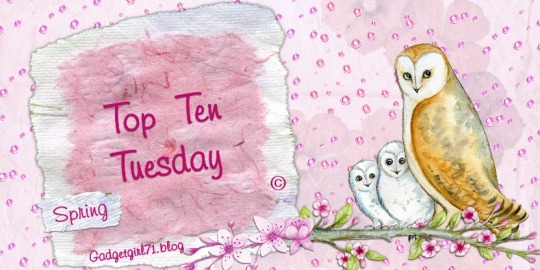
Top Ten Tuesday 16 March 2021
Welcome to this weeks Top Ten Tuesday. Originally created by The Broke & The Bookish, which is now hosted by Jana @ That Artsy Reader Girl. Each week it features a book or literary themed category. This weeks prompt is:
Books On My Spring 2021 TBR
Girl in the Walls (ARC)

Synopsis: Girl in the Walls is a story of overcoming grief, of unconventional friendships and learning that we shouldn’t always fear what we don’t understand. It is about understanding the difference between a house and a home and what it means to lose both. She doesn’t exist. She can’t exist. Elise knows every inch of the house. She knows which boards will creak. She knows where the gaps are in the walls. She knows which parts can take her in, hide her away. It’s home, after all. The home her parents made for her. And home is where you stay, no matter what. Eddie is a teenager now, almost a grown-up. He must no longer believe in the girl he sometimes sees our of the corner of his eye. He needs her to disappear. But when his fierce older brother senses her, too, they are faced with the question of how to get rid of someone they aren’t sure even exists. And, if they cast her out, what other threats might they invite into their home?
Pages: 323, Publication Date: 18 March 2021
The Best Things (ARC)
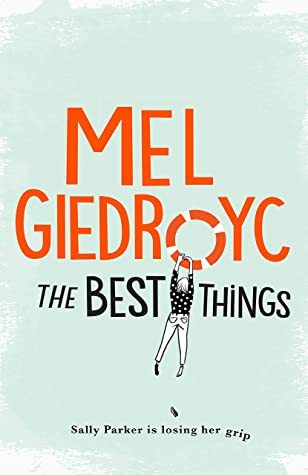
Synopsis: Warm, funny, life-affirming and true, The Best Things is the joyous debut novel from much-loved comedian, writer, actor and presenter Mel Giedroyc.
It’s the story of a family who lose everything, only to find themselves, and each other, along the way.
Sally and Frank Parker have it all.
Then one day, because of Frank, they don’t.
As the bailiffs move in and the money runs out, Sally realises that she and her children don’t have a clue about how to survive.
Or do they?
The Parkers are about to discover that the best things in life aren’t things at all.
Pages: 432, Publication Date: 1 April 2021
The Dictionary of Lost Words (ARC)
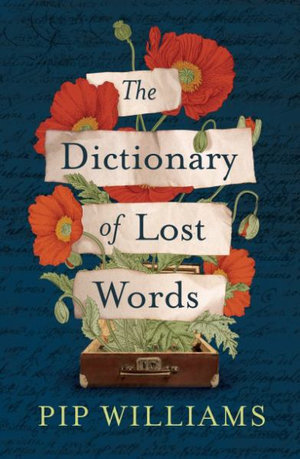
Synopsis: In 1901, the word ‘Bondmaid’ was discovered missing from the Oxford English Dictionary. This is the story of the girl who stole it.
Esme is born into a world of words. Motherless and irrepressibly curious, she spends her childhood in the ‘Scriptorium’, a garden shed in Oxford where her father and a team of dedicated lexicographers are collecting words for the very first Oxford English Dictionary. Esme’s place is beneath the sorting table, unseen and unheard. One day a slip of paper containing the word ‘bondmaid’ flutters to the floor. Esme rescues the slip and stashes it in an old wooden case that belongs to her friend, Lizzie, a young servant in the big house. Esme begins to collect other words from the Scriptorium that are misplaced, discarded or have been neglected by the dictionary men. They help her make sense of the world.
Over time, Esme realises that some words are considered more important than others, and that words and meanings relating to women’s experiences often go unrecorded. While she dedicates her life to the Oxford English Dictionary, secretly, she begins to collect words for another dictionary: The Dictionary of Lost Words.
Set when the women’s suffrage movement was at its height and the Great War loomed, The Dictionary of Lost Words reveals a lost narrative, hidden between the lines of a history written by men. It’s a delightful, lyrical and deeply thought-provoking celebration of words, and the power of language to shape the world and our experience of it.
Pages: 384, Publication Date: 8 April 2021
The Summer Job (ARC)
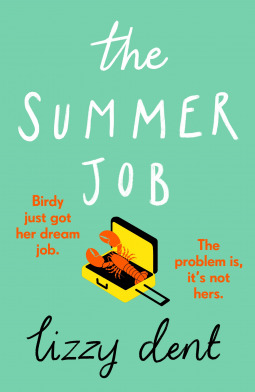
Synopsis: Have you ever imagined running away from your life?
Well Birdy Finch didn’t just imagine it. She did it. Which might’ve been an error. And the life she’s run into? Her best friend, Heather’s.
The only problem is, she hasn’t told Heather. Actually there are a few other problems…
Can Birdy carry off a summer at a luxury Scottish hotel pretending to be her best friend (who incidentally is a world-class wine expert)?
And can she stop herself from falling for the first man she’s ever actually liked (but who thinks she’s someone else)?
A snort-out-loud romcom for fans of The Flatshare.
Pages: 352, Publication Date: 15 April 2021
Cunning Woman (ARC)
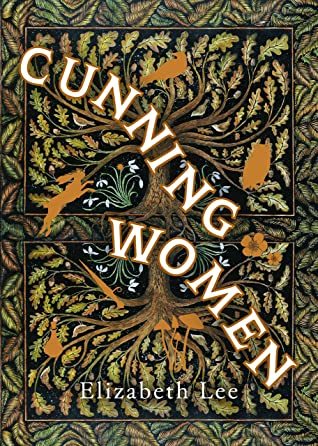
Synopsis: Lee is a magnetic new voice in historical fiction and CUNNING WOMEN is sure to be loved by fans of The Essex Serpent and The Mercies.
Spring of 1620 in a Lancashire fishing community and the memory of the slaughter at Pendle is tight around the neck of Sarah Haworth. A birthmark reveals that Sarah, like her mother, is a witch. Torn between yearning for an ordinary life and desire to discover what dark power she might possess, Sarah’s one hope is that her young sister Annie will be spared this fate.
The Haworth family eke out a meagre existence in the old plague village adjoining a God-fearing community presided over by a seedy magistrate. A society built upon looking the other way, the villagers’ godliness is merely a veneer. But the Haworth women, with their salves and poultices, are judged the real threat to morality.
When Sarah meets lonely farmer’s son Daniel, she begins to dream of a better future. Daniel is in thrall to the wild girl with storms in her eyes, but their bond is tested when a zealous new magistrate vows to root out sins and sinners. In a frenzy of fear and fury, the community begins to turn on one another, and it’s not long before they direct their gaze towards the old plague village … and does Daniel trust that the power Sarah wields over him is truly love, or could it be mere sorcery?
Pages: 332, Publication Date: 22 April 2021
Lost Property (ARC)
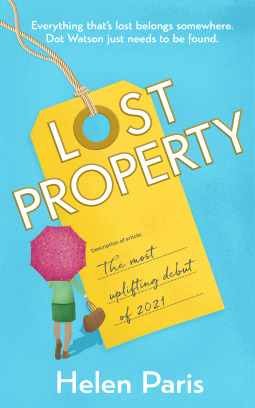
Synopsis: Dot Watson has lost her way. Twelve years ago her life veered off course, and the guilt over what happened still haunts her. Before then she was living in Paris, forging an exciting career; now her time is spent visiting her mother’s care home, fielding interfering calls from her sister and working at the London Transport Lost Property office, diligently cataloguing items as misplaced as herself. But when elderly Mr Appleby arrives in search of his late wife’s purse, his grief stirs something in Dot. Determined to help, she sets off on a mission – one that could start to heal Dot’s own loss and let her find where she belongs once more…
The Perfect Life (ARC)

Synopsis: HAVE YOU EVER WANTED TO BE SOMEONE ELSE? Vanessa has always found it easy to pretend to be somebody different, somebody better. When things get tough in her real life, all she has to do is throw on some nicer clothes, adopt a new accent and she can escape. That’s how it started: looking round houses she couldn’t possibly afford. Harmless fun really. Until it wasn’t. Because a man who lived in one of those houses is dead. And everyone thinks Vanessa killed him…
Pages: 400, Publication Date: 5 August 2021
The Summer Villa (ARC)
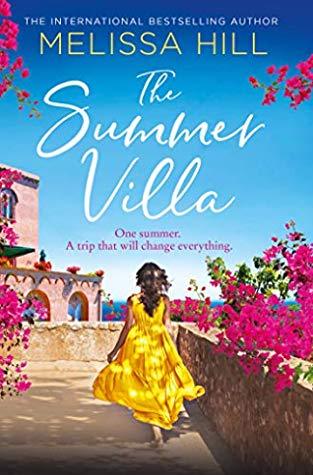
Synopsis: Three women. One summer reunion. Secrets will be revealed…
Villa Dolce Vita, a rambling stone house on the Amalfi Coast, sits high above the Gulf of Naples amid dappled lemon groves and fragrant, tumbling bougainvillea. Kim, Colette and Annie all came to the villa in need of escape and in the process forged an unlikely friendship.
Now, years later, Kim has transformed the crumbling house into a luxury retreat and has invited her friends back for the summer to celebrate.
But as friendships are rekindled under the Italian sun, secrets buried in the past will come to light, and not everyone is happy that the three friends are reuniting… Each woman will have things to face up to if they are all to find true happiness and fully embrace the sweet life.
Pages: 384, Publication Date: 8 August 2019
Trusting Taylor (Silverstone #2)

Synopsis: Former military man turned government assassin Kellan “Eagle” Trowbridge isn’t looking for love. He’d rather keep his head down at his cover job as an employee of Silverstone Towing. That all changes, however, when he meets Taylor Cardin.
Beautiful, smart, and witty Taylor instantly falls for the mysterious tow truck driver, who comforts her both in the aftermath of the car crash she sees firsthand and when the police dismiss her as a credible witness because of her prosopagnosia, or face blindness. Eagle, on the other hand, can remember every person he’s ever met—and the two counterparts forge an immediate connection. But someone else is just as intrigued by Taylor’s unique condition as Eagle is…and his intentions are downright deadly.
Soon, Eagle and Taylor are too caught up in each other to see the danger that’s approaching. But as time runs out, they’ll discover their love isn’t the only thing fighting to survive.
Pages: 278, Publication Date: 2 March 2021
Ransom (Laurel Springs Emergency Response Team)
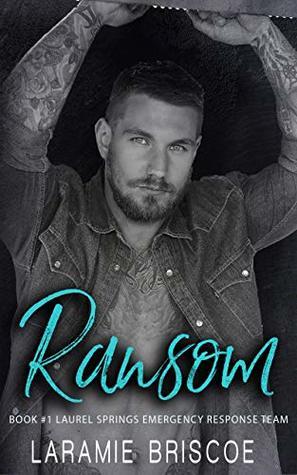
Synopsis: A new series from the author of the Moonshine Task Force Series! Laurel Springs, AL is about to be hotter than a mid-August thunderstorm. When the Moonshine Task Force is absorbed into a new entity, Laurel Springs Emergency Response Team (LSERT) new faces come to town, new love is born, old love is found again, and there’s a plethora of drama and romance happening all over the tri-county area. LSERT puts police, firefighters, nurses, doctors, K-9 handlers, and EMT’s all in harm’s way as they work to keep the area safe from any threat. Emotions run high, passions ignite. Come with me, back to Laurel Springs, in what’s sure to be a wild ride! Ransom Thompson For years I’ve wanted two things – to be a member of the Moonshine Task Force and to be the man Stella Kepler can’t live without. One out of two isn’t bad, or so I tell myself. Being the only K-9 handler for The MTF presents its own share of obstacles, but me and Rambo? We make it work. Life is status quo, until I’m called in to help with what appears to be a hostage situation and Stella is right in the middle of it. This is my one chance, and I’m not going to blow it. Stella Kepler When I’m stuck in an examination room holding a hurt woman and a man with a gun, I do the only thing I can. I sneak out, call 911 and hope help comes quickly. It does. In the form of Ransom Thompson. He and I have known each other since we were babies. Our mother’s are friends, our dad’s work together, and we’ve always been friends. Only, the last few months I’ve started to notice things. How mature he is, how alpha he can be, the chiseled six-pack, and the abundance of ink spreading across his body. When I offer to cook him dinner for saving me, neither one of us know how that one moment will change the course of the rest of our lives.
Pages: 227, Publication Date: 5 January 2019
Until next week.
2 notes
·
View notes
Note
What do you think of Megumi/Cure Lovely's character? At first, I thought she is a person who loves helping others. After Aino family dinner scene in the 36th episode, it got me thinking. Did her intention to help others to make herself useful (so that she could be useful for her mom too) before realizing that helping others is to make everyone's happy? Based on this do you think she have an internal conflicts (e.g. insecurities) throughout the season?
Oh wow, it’s been a while since I’ve seriously thought about HaCha and mymemory is quite awful so please excuse anything I might’ve missed in answeringyour question.
Umm…well, my initial impression of Megumi was that she was like Mana andLove in the respect that they really, really liked the idea of “love”w/o truly understanding what that meant at first. Personally, I’m not fond ofthat type of vague characterization and with HaCha’s story focusing on Himemost of the time until the last quarter of the season, I didn’t pay a lot ofattention to Megumi.
But then ep 36 happened as did her unrequited romance arc with Blue rightafterwards and that brought more perspective into her character and why she wasso fervent about the concept of “happiness for everyone” (besides the fact thatit was her mom who taught her the importance of helping others).
I do believe Megumi loves being helpful because she’s just that kindof person to want everyone to be smiling. But prior to ep 36, I think there wasa selfish motivation behind that, too? Not in a bad way but in a waythat she’d unconsciously expect some kind of reciprocation whenever shedid a good deed for someone. Which is understandable. I mean, if you didsomeone a favor or good will, wouldn’t it be nice for them to thank you inreturn?
So I guess (and I really need to rewatch ep 36 again to be sure so don’ttake this as my final word on it) while she was taking care of her mum, she gotused to someone relying on her and thanking her for all the trouble she wentthrough. And that feeling may have merged with her desire to help others. Sheloved caring for people and making them happy but she also liked their appreciation of her effort just asmuch. That was her flawed definition of “love”. An ongoing cycle of “happiness”.
But then her mom started to get better and Blue couldn’t return her feelingssince he was still in love with Mirage so Megumi had to learn to accept the “greaterhappiness”.
And what I think the “greaterhappiness” means in the context of Megumi’sdevelopment is this: it’s that the status quo can be broken and not all lovewill be equally distributed. AKA not everyone can be happy at the same time.
What made Megumi comfortable before (taking care of her mom) was changingand she became a little lost on why she wanted to help others in the first place.However, she recovered pretty quickly after realizing being happy for someoneelse’s happiness is enough. Her mom overcoming her illness was a greaterhappiness than the satisfaction Megumi got while taking care of her mom.
As for Blue, that was a tougher case because by the time Megumi realized herlove for him, she knew it would be impossible for him to reciprocate. So shestruggled with her feelings as she did her best to support him in hisconfrontation with Mirage. Of course she wanted Blue to love her back.Everything she did for him was proof that she loved him. But she also wanted tosee him happy and the only person in the world who can make him happy wasMirage. And it took a while but she eventually came to terms with it. Shecouldn’t be that special person for Blue, which was painful, but she was glad,nonetheless, that he could reunite with the person who is. The happiness of herbeloved was more important than her own.
I’m not sure if that answers your question or not and I’m sorry if it didn’tbut…looking back on Megumi’s arc like this, I believe what I said above can beconsidered an insecurity of hers? She had this fixed idea on what “love” and “happiness”should be like until her later experiences proved otherwise, which then pushedher to grow as person and therefore, get a better understanding of “love” and “happiness”.
…is what I think. *shrug*
#again going on a very faulty memory here so I can be wrong on ALL counts#but i'll stick with this for explanation for now#happiness charge precure#cure lovely#aino megumi#replies
5 notes
·
View notes
Text
Good Stuff - THE TROOF ABOUT STEVEN UNIVERSE - Part 4
WARNING: When you cartwheel, the weight is mostly from your legs. And if you want to know more, here’s part 3 for a better understanding. Thank you, take care out there, and enjoy.
Steven Universe is a charming, popular show with a quad-polar fandom, and I’m only here to point out what I say is legitimately wrong with this cartoon. Simple enough? Fair enough. Point number 4:
THE REPRESENTATION:
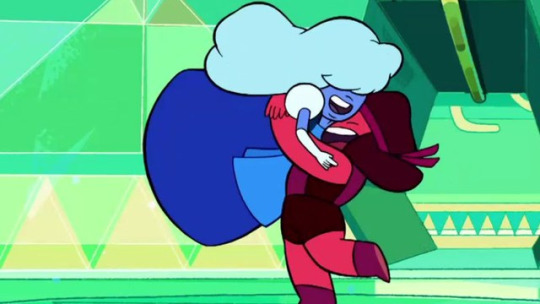
Representation in media can be easy when the right writers are at the helm to present (not push) a message of acceptance and acknowledgement towards an audience that may or may not feel the same way. It takes different strokes to rule the world, after all. However, when it comes to character in general, there are two factors in characterization that when used correctly can appeal their message of acceptance for their audience. One, visual acknowledgement of the representing characters (POC, LGBT, belief, etc.) in question and two, giving the subjects good quality participation to show that they are just as adept to the world as any other without phoning in the fact that they are this or that. Long story short, make ‘em good characters and the representation can earn the audience’s respect for itself. Steven U lacks this too, and this comes from them often showing us stuff and expecting us to just go with it, with themes that are enough just to get by fans. Hell, they show us as much as a drive by...

Not even a cool one at that, fresh
I’ll say this to start off: Lars Barriga (my neega) was a stagnant and frustrating character to deal with, nobody in Beach City moved him in any way (not even his own supporting parents), and the writers just shotgunned him growth (more than once) after he basically had to cheat death (more than once) to gain a better conscience. It’s like they wanted to call him a lost cause but had to hook him back in some way for the audience to not deem him a lost cause. So with all due respect, does it matter that he’s Filipino or a trans boy when nothing valuable or thoughtful has come from him especially? Those trivial tidbits can mostly come off as add ons or secondary nods, when they should’ve been welcomed knowledge about his character. Want an good example? Look to the comic series Lumberjanes, especially issues 14-17 and 28. SPOILERS, though...
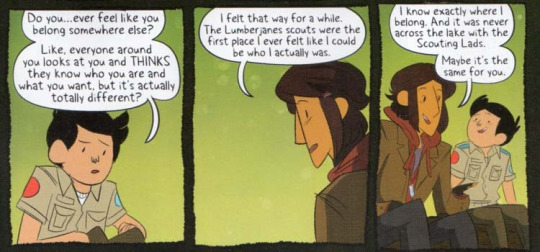
They did this right for characters Jo and Barney (Jo’s the one in the 2nd panel, Barney’s in the first). They already established these two as well defined characters that make mistakes but are willing to get shit done for their friends by any means. The dialogue above is when Barney is thinking about joining the girl oriented scouts even when he’s considered a boy scout, wondering where does he want to belong. Jo gives him reassurance that she herself felt the same and just wants Barney to assert himself with what he wants to be like she did. And when he does later on, he’s accepted without any forced gratification and the writers gracefully accommodate this to not only make him (now “them”) a good addition to the story’s world, but a welcoming new perspective.
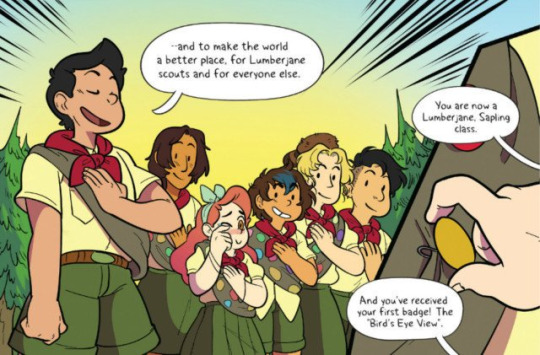
The representation is therefore earned, not just shown off
Now I’d talk further on other characters like Lars, but that would be singing the same beats as my previous piece on world building and would spoil notes on the final 2 parts I’m working on now. Instead, the gems are another reason why the rep-pres-sen-tation in SU is nothing but small fractured penny in the gold mine that is anything else going on, with fusion diminishing the relationship representation of Steven U; however you may see it. Now excuse me... this is the hardest part of my job.
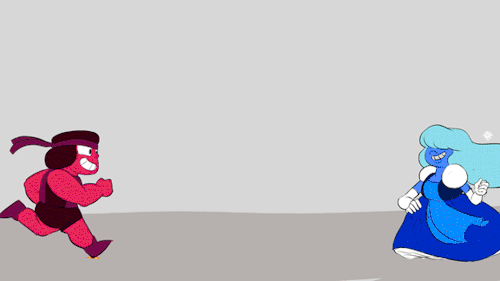
Criticizing love
Garnet is not a good embodiment of Ruby and Sapphire’s love; Ruby and Sapphire is. I would love to see Ruby and Sapphire being together and showing me why they decided to elope, but I can’t because Garnet is a curtain that metaphorically and literally covers said love from having anything more to say than “HELL YEAH WE LOVE EACH OTHER!”. You could say ‘Keystone Motel’ offered some adversity for the two, but knowing Steven U, it didn’t feel like much beyond me knowing they’re getting back together in the end because they love each other and they just go back to being Garnet because she’s the personification of their love and such.
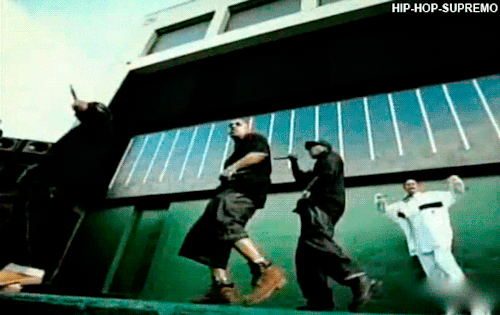
Status Quo Ante. Ante up, you see?
Fusion is something I have a disdain for now because they’re exchanging two characters’ development of united growth for basically an entirely new/different character, that don’t have much screen time or development anyways (vice versa in Flourite’s case). You could say ‘Know your Fusion’ presented an evolution for Smokey Quartz, among the other known fusions, to being more than a versatile fighter, but not really no. We were already aware that Steven and Amethyst were acknowledged sad sacks before they fused, so what else does this fusion offer differently than in their ability? As for Sardonyx, she hasn’t changed from her first cameo awhile back and her vanity was the only thing that made her stand out in said episode. All in all, fusion doesn’t reflect a relationship, no matter how hard Rebecca Suge Knight is saying otherwise, it reflects an aftermath; one that’s in and out as a firework. This and up ‘til now, the real couples we see are pretty general or under the rug. To show how the most mentioned and presented couple in the series, RubyXSapphire, has continuously got the shaft, I present the one dynamic you’d least expect: A boy and his stuffed toy.
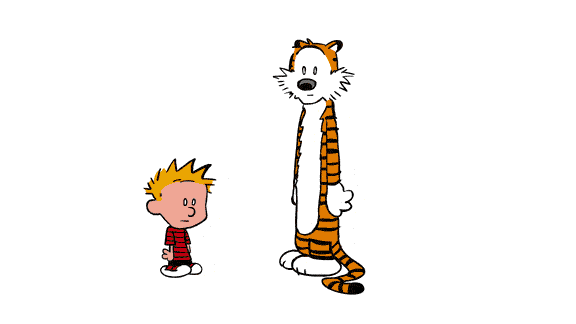
My personally favorite example so far.
Calvin and Hobbes is a series about boy Calvin and his stuffed tiger Hobbes that comes to life through Calvin’s imagination. Reality is like Garnet in this case, where it’s just Calvin having his stuffed animal around to get into zany hijinks like any other kid his age. Then again, the imagination or the living Hobbes is whom is given more of a focus, allowing their dynamic to bloom in a way that wouldn’t be understood if we just saw Calvin just talking to his toy the whole time. It makes their bond feel real and that’s what RubyxSapphire should be, giving them the floor in a way that adds up to Garnet’s eventual debut. “But Monkey Network, what about ‘The Answer'?” The Answer is an episode that, while sweet and good looking, literally danced over much necessary development in favor of only showing us how they eventually stuck to being Garnet forever. Not saying Garnet doesn’t have any character herself, but her integral backstory was/is one of the most beloved and talked about in terms of relationships, yet little has actually been given to us beyond face value and basic understanding and the writers have generally avoid pressing this any further. In a way, that episode diminishes the representation of real queer relationships, bogging it down to early Disney romances like Snow White’s, and practically blindfolds us about what we want to see vs what we should be seeing.
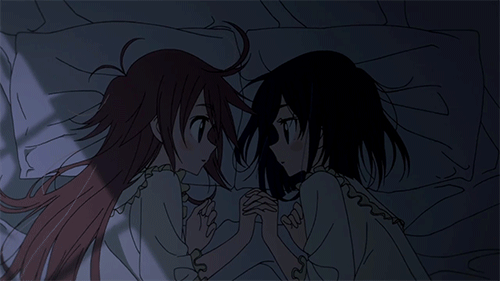
And I already got cute girls not kissing last year. It’s the current flippin’ year
I would talk about all the other canonning “ships” but nothing comes to mind other than the gems are getting along better than before, Mystery Girl is still fine as fuck, Steven and Connie are bound to elope since it’s been presented since the beginning, Lapis and Peridot get along as college roommates, Lapis might still have issues after Malachite happened, Jasper regrets nothing, Topaz sounds cool from the little we got of them, and everything has amounts to having a sob story and/or a recollection of thoughts just to say “Hey, we’re good together”. They implicitly share infatuation and good vibes to each other, but nothing to say their themes of LGBT, relationships, and characterization are groundbreaking. The latter I’ll get to next time. I mean anybody can put effort into writing a genuine romance novel, though it takes more effort to push the romance to challenging means without leaving skeptics at the door, something Sugar has been very casual about and is starting to openly show in the show. That and tears. Because you know what they say, open emotions are better than emotional maturity. Isn’t that right, TV?
youtube
Though, a good cry like that never hurts once in a while
Don’t get me wrong. Rebecca Sugarbark is out here doing her darndest as...
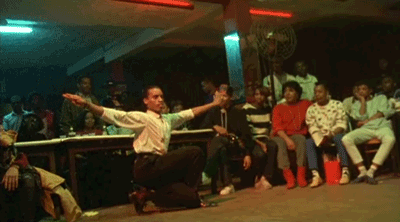
CARTOON. NETWORK’S. FIRST. FEMALE. ANIMATED. SERIES. CREATOR!
and when she does themes right, the show provides some good things to think about. But when she muddles them up or casually throws them in, especially when these themes come from the different aspects of what makes a person different yet real, it is unforgivable. And when people of all ages are watching this, thinking with their living ideologies about what could be used to think differently? This makes for a very risky tightrope that can lead to either people taking it appropriately or blindly, good and bad alike. I can only hope that as the show goes on, there are less assumptions and implications from both the show and the audience alike and more assertions and certainty that elements like representation of any kind are brought to a more applied approach than a glanced approach. Something that earns that appeal to a world so open and free.
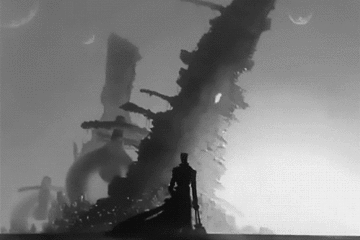
Yet. As nothing but a simple critic... I can only be so hopeful
#steven universe#su#su critical#su criticism#su critique#representation#cartoons#reviews#analysis#long post#Good Stuff#Roy Macintosh#ye#Calvin and Hobbes#Lumberjanes#gifs
68 notes
·
View notes
Text
The Master
Every now and then something really petty just gets to me, like when I decided that the world really needed to hear me dismantle the dialogue in the Stars and Moons scene. This is another one of those times.
I've talked about the Master of Laketown in passing a few times, but have never really focussed on him just because I've always had bigger fish to fry. He's ultimately a completely unnecessary character, who for some reason the movie seemed to think needed to get a disproportionate amount of attention. And when I was thinking again about death scenes, trying to get a good handle on what I actually think of Thorin's, I decided that enough was enough and I had to talk about this guy and all the niggly little overlapping problems he represents.
Spoilers for the Hobbit Movies, The Hobbit, and Lord of the Rings (book and movies).
What was the point of this character? I can tell you in the book: he provided some local flavour, gave the dwarves a stepping-stone on their journey, and also provided an aesop about avarice and selfishness in the way that he died. In the movie... well, I guess the stepping-stone point still holds? He does give the dwarves supplies and a boat. But what would have happened if he hadn't? After all, because those movies are allergic to maps, the dwarves seemed to take about five minutes to get from Laketown to the Lonely Mountain, and then they were inside within half an hour. They didn't really seem all that reliant on anything they got from Laketown. They weren't negatively physically affected by their journey that far, as they were in the book, so they didn't need recovery time (caveat for Kili, but the Master might as well never have existed for all the effect he had on Kili's recovery - that was all Tauriel and a little bit Bard for providing the venue).
The stop in Laketown really has very little purpose and effect, and what purpose and effect it did have (introducing Bard, providing an action setpiece for the opening of Battle of the Five Armies, giving Tauriel and Kili some alone time) were completely unrelated to the Master.
What about local flavour? Well, in the book he and Bard actually had a political relationship in the days after the destruction of Laketown (yeah, days - movies, you had triple the time you needed, why did you need to temporally compress everything?). He actually made points about the qualifications required for rule, which gave us a window into what was important in his society: Laketown is unique in Middle-earth as a mercantile city-state and that's awesome.
PS: Another sad simplification for the movie: Laketown and Dale remained separate in the book. It is not the case that that city-state was just turned into another hereditary monarchy at the end of The Hobbit.
In the movie? Well... there's kind of an abortive subplot about Laketown being an oppressive police state, and... OK, I need to get this off my chest a bit.

What the hell is that?
I'll tell you one thing it bloody isn't: an artistic style that fits with the rest of this world. Look at the rest of Middle-earth. Look at it. We're hitting each other with broadswords and burying the dead in barrows. This is, like, Saxon period, maybe early medieval. You want to know what Saxon royal portraiture looked like?

(Source)
Quite nice, I think. A frieze of that sort of thing around the room would have looked great. That wretched thing up there looks more like a Vermeer.
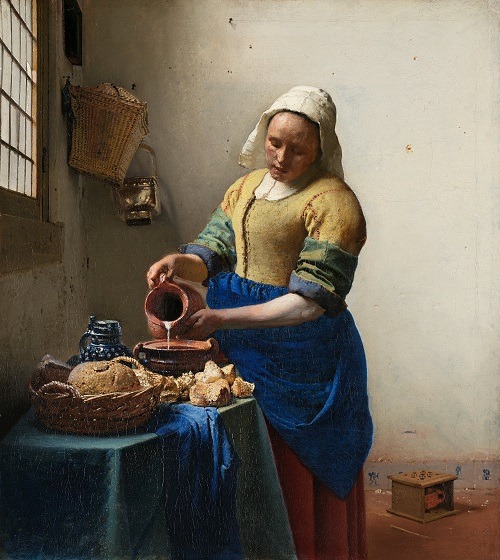
(Source)
And that's not a criticism, by the way; I actually really like Vermeer's paintings and the theories for how he achieved such photorealism are fascinating. However, it does not fit in this setting. It just doesn't, even when I remember that this is a fantasy story and historical accuracy doesn't fully apply. I snorted when I saw that in the movie because it just looks like a photo with an 'oil painting' filter applied in photoshop. The vivid colours look like something out of a cartoon, especially with how dark and monochrome everything else in these movies is. It does not work. People more knowledgeable than me have placed it (and the style of dress it shows) as William III: mid-late 17th Century.
Fail!
But OK, that's a silly nitpick, especially with this beautiful Alan Lee watercolour on the wall in Rivendell. It just really irritates me because it's an example of how they put making the stupid point they want to make right now above actually fitting anything together so it made sense and it's not the same as the Rivendell picture because that actually looks like a mural, the colours blend in, and it fits the flowing and naturalistic style of the large amount of other art we see around Rivendell so it works in its setting and I hate that picture of the Master, I hate it a lot.

Moving on.
No, not moving on. I said they were making a stupid point with that picture. Well, that and a stupid joke where we see that picture of him looking like a seventeenth-century fop and then we see that he's actually got the grooming skills of a toddler. Solid joke, too: excellent setup, quality punchline, raising a lot of questions about where the hell they got that volume of realgar (used as orange pigment and also rat poison - I learned a lot writing this post!). It's the rule of three.
OK, I really am going to rein it in; I promise this whole post is not going to be about that picture, even though it annoys me more the more I think about it. I do have a point.
The Master's entire characterisation was as this avaricious democracy-hating despot who would be defeated by the plucky underdog Bard. And that's... acceptable. I mean, you could have done something with it, and it wouldn't have completely derailed the plot the way the added socio-political commentary that nobody asked for did in Last of the Mohicans, which, for anyone curious, made me angrier than any other movie in the world until Battle of the Five Armies. I hate that movie, and the added socio-political commentary that nobody asked for was a major factor (others include the added romance subplot nobody asked for, the decision to render most of the main characters utterly unrecognisable including swapping the plot roles of the two women because, hell, they're interchangeable I guess, and the fact that my favourite character escaped that fate because they cut him completely). But I digress.
Presenting the Master as an avaricious democracy-hating despot would not in itself have been a problem. They did have a lot of extra time, they could spend some on the political situation in Laketown in order to set up Bard for later. However... OK, first of all, being against democracy does not in itself work as a flag that the character is evil or an attitude to be overcome when your beloved hero - by which I mean Thorin - is only of interest to anyone because he's the hereditary ruler of a kingdom. Just sayin'. Also, it doesn't count when you don't do anything with it. There's the one throwaway about an election, then it's never mentioned again unless you count the fact that Bard becomes king through popular acclaim, which I don't.
Let's talk about Bard as a foil of the Master and the beneficiary of this aesop about democracy good, monarchy (as in rule by one person, not necessarily hereditary) bad. Bard says some stuff about the people starving and seems to be setting himself up as a champion of the common folk - he's even referred to as such - but it doesn't work. First of all, the stuff about food supplies only comes up when he's trying to smuggle the dwarves into Laketown, so we don't know if this is a regular thing that he genuinely cares about, or if he was just using it as a convenient excuse to stop the dwarves being found. It never comes up again and, in fact, we never even see him arranging for the fish to be distributed or anything like that; he just uses them as a bribe for the dock-keeper who saw the dwarves disembark. This suggests that it's not actually something he cares about on its own, just a means to an end.
The Master apparently does consider him a threat, but we're given no real idea why; he and Alfrid discuss the fact that there's discontent in the city and people are speaking against the Master's rule, but we never actually see that happening and we certainly never see Bard's involvement in it. The only reason I can see for the Master to guess that Bard is the ringleader of revolution is that... oh, would you look at this for your aesop? He has royal blood. After all, the Master does know that about him, even though he himself seems determined to keep it quiet.
When Bard is later proclaimed king by popular acclaim, he doesn't do anything with it. In fact, he almost entirely rejects it; while he takes on a leadership role, it's visibly unwillingly and he almost entirely defers to Thranduil upon Thranduil's arrival. The only person who acknowledges him as king is Alfrid, and we're clearly supposed to find that annoying; Bard certainly does. Even the movie never acknowledges him as a king, since it constantly shows him as less powerful and less respected than the two kings and we never see him crowned or treated as a ruler. As far as we can tell from the theatrical release of the movie, after the Battle of the Five Armies Bard shrugs and goes back to plying his trade as a bargeman. Him being proclaimed king means nothing.
Overall, Bard actually appears to be startlingly apolitical. The one exception is also the one time he actually challenges the Master himself: over whether they should help Thorin. He is promptly shot down and goes home to sulk. If anything, Bard seems to be fighting for the status quo while the Master is aiming for things to change and improve for the town - I don't think that was what you meant to be going for, Movie!
This was a mistake on the part of the movie, and one that Tolkien didn't make because Tolkien didn't frame Bard vs The Master as the champion of the common people vs a democracy-hating despot running a police state for his own enrichment. Once you have that set up, Movie, you have to do something with it.
But OK, it was one thing that the movie just threw in without any apparent thought beyond "Hey, if we frame Bard as the champion of the common people and the Master as wanting to prevent free and fair elections, the American audience will know who to root for". Let's look at the aesop they beat into the floor when it came to the Master: "Gold is worth less than people".
Now, this is actually an important aesop because not only does it come from the book (and I'll come back to how Tolkien handles it) but in the movies it's presented via no fewer than three characters - four if you count Alfrid and the Master as separate characters. It appears in Bard's last scene with Alfrid, the presentation of Thranduil and his motivations, and Thorin's arc with respect to Dragonsickness. This is clearly a big thing, and with the Master his prioritisation of gold over human life is beaten in to the point where he's really carrying the characterisation beat of "avarice makes you evil". It comes right from his first introduction with that wretched painting - see, I told you I had a point - showing his ostentatious wealth in a manner that almost makes me think of Louis XVI -
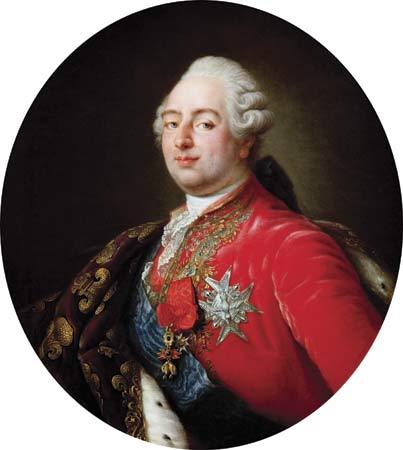
(Source)
Just to bring back that political thing that died on arrival to the point where I'm still not sure it was intentional
- and his last act is trying to evacuate the town's treasury while announcing that it's such a shame that that means there's no room for any people. It's then continued with Alfrid, whose last act in the movie is deciding to disguise himself as a woman to escape the battle and then flee with a load of gold that was in Dale for no reason except to set up this resolution. No, really, what was it doing there?
Anyway, I said this was an aesop from the book, and it is. In fact, in the book the Master is even the clearest example of the aesop playing out: Bard, as king of Dale, sends a large quantity of treasure to the Master to help with the reconstruction of Laketown. The Master steals as much treasure as he can carry and flees into the wilderness, where he dies of hunger and cold, abandoned by his companions, in an action explicitly blamed on Dragonsickness. His avarice and selfishness directly leads to his death, and this is contrasted with the heroic characters who share treasure to enrich people and the land about - even Thorin acknowledges on his own deathbed that his selfishness was wrong and renounces his deeds and words at the gate. Note that the Master being greedy and selfish was a trait that Tolkien had established, but it wasn't hugely overt; he was selfish, sure, and kind of manipulative and not terribly interested in doing the right thing for its own sake, but he was presented as a human being with his own motives and interests, not a caricature.
OK, so I was going to just make a sneering remark like "Pfft, complex characters with human failings? That's kids' stuff", but the difference in the way this character is handled is actually symptomatic of a lot of problems.
First, and most obvious... Movie, what age is your target audience? Because this tastes like a movie for twelve-year-olds, but the characterisation would be simplistic in a story for toddlers. You position yourself as a serious and mature story, in opposition to The Hobbit, which was written as a bedtime story for children, but by every metric I can think of you are significantly more childish. Note 'childish', not 'suitable for children'.
Second, I mentioned that in the book the Master's death is treated as a consequence of his actions. The causal relationship is very clear: if he had stayed in Laketown and used the treasure for its intended purpose, he would not have died. This means that the aesop is clear: if you're greedy and selfish, you'll suffer consequences.
So... the movie. In the movie, they changed how and where the Master died: Smaug fell on him as he was escaping Laketown. The Master is greedy and selfish, and because the movie thinks we're stupid it really makes it clear that he's greedy and selfish and that's bad, not only showing him literally kicking someone in the face when they try to climb onto the boat, but also showing his barge almost running down Tauriel and co. after Tauriel has consistently been shown as the angelic personification of goodness and light. It could not be clearer that the Master is a bad guy. And then he dies on his way out, so we're good, right? Karma worked itself out, bad things happen to bad people, all is well.
Problem one: It doesn't count when there's absolutely no causal relationship between the Master's actions and his death. In the book, the one was a direct consequence of the other. In the movie, his death was pure accident. If his boat had been filled with the occupants of the orphanage and all the puppies and kittens they could carry, Smaug would still have fallen on it.
Problem two: They gave themselves a second chance with Alfrid.
That's it. That's the problem.
I'm kidding, I just really hate that character. From his first appearance I assumed he was going to get eaten by Smaug and I was bitterly disappointed when that didn't happen because I was genuinely looking forward to it.
Anyway, They kind of pass the baton of "avarice and selfishness make you evil" to Alfrid, but the avarice angle is actually almost entirely dropped while the selfishness angle is treated as a running joke. To an extent the avarice angle is shifted over to the conflict between Thranduil and Thorin in that we've kind of got the "Thranduil wants treasure" thing hanging around, but... it doesn't work.
Unlike in the book, you're completely failing to examine Thorin's flaws and are treating his avarice and selfishness as not his responsibility.
Thranduil can't carry this moral because you may be jumping around talking about how he's evil, but his iconic line is still "I came to reclaim something of mine" - he wants one specific item which is his by right; this isn't about greed and, in fact, Thorin ends up looking greedy and petty by declaring he'd rather fight a war than toss out one necklace that isn't even his.
Bilbo isn't carrying the moral either because you've made his motivations about personal loyalty to Thorin rather than generosity and selflessness.
The only people around here who seem to actually want treasure generally are Thorin and Bard, both of whom are a) heroic and b) justified in that desire: it's not Thorin's fault, and Bard actually needs money for a specific purpose.
In fact, I'd like to take a moment to dwell on Thorin. I've covered elsewhere the fact that the Arkenstone wipes away all Thorin's flaws by taking the blame for his behaviour; without that, the movie has actually opened itself up quite badly for comparison between Thorin and the Master. Think about it: for a good chunk of Battle of the Five Armies, Thorin is sitting on a pile of gold, thinking more about how he can defend and keep his gold than about how he could spend it to pay his debts and help the starving people camped outside. That's Dragonsickness, and really the behaviour that the movie was decrying in the Master just a little while before. But Thorin has the excuse of the Arkenstone.
Incidentally, the Master's been living outside the mountain that contains the Arkenstone for some time. Why doesn't he have the excuse of the Arkenstone? We don't know how that thing works, but if we're gong to blame Thorin's behaviour on it, you clearly don't have to be in sight or touch of it. Your double standards are showing again, Movie. You should have taken the time to do character flaws and examine them properly.
Anyway, the aesop is pretty much dropped for most of Battle of the Five Armies. If I were feeling malicious, I'd say that it was precisely because they couldn't risk the audience applying it to Our Heroes and maybe thinking that Thorin isn't a shining beacon of goodness and light.
Of course, I'm not feeling malicious; when have I ever been malicious towards Thorin except for every time I talk about him? My point here is Alfrid.
Alfrid is clearly not a character to be taken seriously in any way whatsoever, and for most of this time he just comes across as slimy. He's not a threat, and he actually doesn't come across as that greedy for gold either; he's just selfish and slimy and makes me want a shower just from being in his proximity. However, he also strikes the last note on the "avarice and selfishness makes you evil" moral in his last scene, which is also the only time he and Bard are actually positioned in opposition to one another after Bard gains power.
Yeah... that last bit is a big problem, by the way, because Bard has just spent the entire movie letting Alfrid get away with whatever he wants. He's not the only one, but he's the one for whom it's a big problem because the interaction between these two has been set up and now it's not going anywhere. This could have been the way Bard shows himself as different to the Master - the Master allows Alfrid to hang on his coat-tails and use that position to bully those weaker than himself; not like Bard, who... glares at him from time to time while he hangs on Bard's coat-tails and uses that position to bully those weaker than himself.
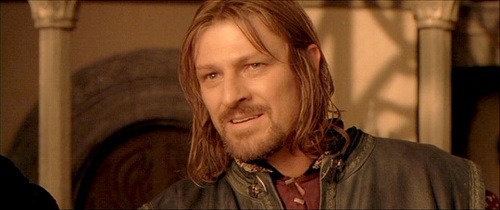
Movie, did anyone ever actually look at you in production and ask themselves if any of the decisions they were making were good?
I'll come back to Bard and the Master as foils for each other; right now I'm talking about Alfrid. Alfrid continuing to get away with things is a problem on multiple levels (it's not funny, Movie, and no matter how many times you do it it doesn't become funny), but surely they're going to at least have the aesop come home to roost: Alfrid steals the money and runs away, just as the Master did, but this time that greed is going to bite him in the behind and he's going to get his comeuppance. Maybe he can't run carrying the gold and a troll catches him, or something.
Instead, Bard catches up to him, saving his children en route, they have a conversation in which Alfrid says he has gold and asks what Bard has, Bard looks meaningfully at the kids, and Alfrid leaves. We never see him again.
Now, I've complained repeatedly that Alfrid's the only one who gets a happy ending. He gets gold, which is apparently what he wants, and he leaves to go set up somewhere else. He faces absolutely no consequence for his actions. Bard looks down on him, but he's been doing that the whole time and Alfrid clearly doesn't care. Even Bard's last shot mocking Alfrid isn't commenting on him being greedy and selfish, it's mocking him for dressing as a woman.
Dammit, Movie!
You didn't even have Bard take the money away and send Alfrid away empty-handed. At least then he'd have been humiliated, lost his political position, and gained nothing. As it is? He's mocked by someone he holds in no esteem and walks away with what he wants. That means that you have this aesop you've been building up with the Master and which you actually explicitly hit by comparing Alfrid's and Bard's motivations in this scene... but then it all falls apart because Alfrid faces no consequence for his actions!
So it doesn't work with the Master because of lack of causality between action and consequence and it doesn't work with Alfrid because of lack of consequence. The movie tells us that avarice is bad, but doesn't do anything with it. The Master continues to be an entirely useless character.
So I was going to talk some more about the relationships and conflict between the Master and other characters, especially Bard, and I'm actually going to start with the ending because that also plays into the aesop.
In the book, Dragonsickness is basically avarice and selfishness - those two traits that we've been talking about this whole time. It's all about gathering together a big pile of gold just to have and to guard for yourself and never enjoying it, sharing it, or even using it. This is a trait that we see in the Master and he dies because of it, as I outlined above. However, in the book it's also a trait we see in Thorin, and the comparison is drawn through the motif of Dragonsickness; it's never explicit, but it is there.
Thorin redeems himself by ending his isolationist power-play against Bard and Thranduil and coming out to rally all three of the enemies of the goblins in battle. After his death, the hoard is distributed - Bard, the Master, Thranduil, and Bilbo all get some as well as a large amount being retained by the dwarves. In the epilogue, we see that Bilbo now leads a comfortable and wealthy life back in the Shire - his waistcoat is more extensive and has real gold buttons - but we also learn that he throws excellent parties and gives excellent gifts (tellingly, if I may look ahead to Lord of the Rings, the last of his share goes to Sam to help him get married and start a family). We also hear that Dale and the Lonely Mountain and their environs are now prosperous and life has returned to the desolation left by Smaug. This is how Smaug's legacy is broken and the Dragonsickness loses its hold. The message is that it's not that it's bad to be rich, it's that it's bad to just sit on money just in order to have it.
I really want to spin off into a ramble about the role of a lord as a giver of gifts in the Saxon societies with which Tolkein was highly familiar, but I really need to stay at least close to the point, which is that the Master is compared to Bard and Dain on a large scale and to Bilbo on a small one. The last three are presented as good and heroic in part because of their generosity, while the Master is bad because of his selfishness.
And this is yet another way in which the ending of the Hobbit movies fails: we don't see what happens with the hoard. Thorin dies, Bilbo goes home, he's sad about his bro dying, and we segue back into Lord of the Rings with no further mention of all the things that just happened. To all appearances, Bilbo doesn't get a single coin from the hoard. Nor does Bard. Thranduil doesn't get his necklace back. To all appearances, Dain just sits on that treasure like Thorin, Smaug, and Thror before him.
So why are any of these people better than the Master?
Well, for one thing the movies - and I include the Lord of the Rings movies in this - seem to have a really uncomfortable relationship with social hierarchy, especially among the hobbits, so I'm not surprised that they didn't want to deal with Bilbo coming home rich. The thing is... if you don't want to tell a story in which the hero comes home rich, don't tell The Hobbit. You could have got away with it - stick in a montage in which we see that he gave away lots of money to... OK, that would mean you'd have to admit that there's relative poverty in the Shire. And we don't want that sort of complication. Poverty only happens to bad societies ruled by bad people like the Master and if you just replace the guy in charge all those problems will just vanish.
I'm getting off-topic here, but I do have to address this because it's true that poverty is not a big issue in Middle-earth. Everyone seems to have enough to live off, even if not in any luxury; nobody seems to be homeless; you never see beggars even in large cities like Minas Tirith; and so forth. However, Tolkien does seem aware that there exist at least haves and have-lesses. The Shire does have a social structure and there are issues of class in play, most obviously between the Bagginses and the Gamgees. The Bagginses are gentry and the Gamgees are working-class and this is a clear split. It's ignored in the movies, in which there seems to be no class split between Frodo and Sam; it's just that for some reason Sam calls Frodo "Mr Frodo" and Frodo never takes a turn to cook dinner.
Anyway, I think that's part of why the movies didn't want an epilogue in which we see that Bilbo is now fabulously wealthy and can afford to give generous gifts to everyone who comes to celebrate his birthday with him.
To pull back up to wider scope, the Shire isn't the only society that gets hit by the movies' discomfort with social hierarchy. And I'm not going to pretend that I'm not guilty of this problem too - we're raised in this egalitarian Western society where, especially in American culture, everyone's supposed to be socially equal, and this is escapism, so we want to have the equality that we want to believe is present in society. However, fantasy comes with tropes like kingship which are hard not to write unless you're doing it on purpose, so it's easy to end up in this weird, uncomfortable halfway-house.
Especially if you're adapting Tolkien, you're not in a position to criticise or remove the institution of kingship even if you want to; Tolkien's work is a major reason these tropes exist in fantasy. However, that means that if you're this uncomfortable with writing about social hierarchy, you might not want to do Tolkien. Play in his world, have fun, study particular aspects, flesh out parts of the world he didn't write about, whatever, but you probably shouldn't adapt Lord of the Rings and The Hobbit and claim that you're doing a true adaptation.
This is relevant because I think this is part of what's going on with the Master, and to an extent with Denethor: these two men are definite forms of social authority which cannot be ignored, but they are not kings. Denethor is treated as a bad person, but the Master is not only treated as a bad person but also as an illegitimate authority because the movies straight up don't know what to do with a ruler who's not a king. They know what to do with Thorin because he's the rightful king. They know what to do with Thranduil because he's a king. They can't handle the Master (and didn't consider the possibility of just thinking of 'Master' as a synonym for 'President' and moving on with their day).
Incidentally, just to make my point a bit more? The movies are actually also not comfortable with Legolas and Tauriel. Their authority comes into the category of being possible to ignore, so they ignore it: Legolas is a prince and Tauriel is an extremely high-ranking military officer, but neither are treated as socially superior to anyone else. We never see them show authority or shown deference, right down to Tauriel never being referred to by title and Legolas being given the job of guarding the orc during the Interrogation scene despite the fact that that's the kind of job you'd normally give to a random soldier. Looking at it from this angle, I think this is part of the movies' discomfort with non-king authority and social hierarchy. These two aren't a king and a queen, so the movies don't want to show them in a position of authority. Admittedly, this hits Legolas way less hard than Tauriel; I don't know if that's a gender thing, a character role thing, or a royalty thing, though.
Anyway, my point is the Master. The movies can't ignore his high social rank as they do with Legolas, Tauriel, Frodo, Merry, Pippin, Faramir, etc., so they present his authority as illegitimate. This is another possible purpose for his presentation as a democracy-hating despot: it underlines his fundamental insecurity and the fact that he doesn't have a true mandate.
So... is the purpose of the Master to give us the message that hereditary monarchy is the only legitimate form of authority? Because if so... the movie has more guts than I give it credit for. Somehow, though, I don't think it's very likely.
It's not doing a bad impression of it, though, and this is where I finally have to drag myself back to those character comparisons. Specifically, the most important heroic character relative to the Master: Bard.
I already talked about how Bard seems to be pretty apolitical and the problems this introduces for his character, especially by comparison to the book; in the book he doesn't seem to have been a particularly political guy, but when duty called he stepped up, took the leadership role that was offered, and did something with it. He was going around making sure that people had food and shelter while the Master sat down and called for food and firewood to be brought to him. That's one of the few points of comparison between them, and it's very telling. Bard is actually seen alongside Thorin and Thranduil far more than the Master, but the comparison is still present because these two are rivals for leadership after Bard has shot Smaug and been proclaimed king. Up until that point, though, Bard and the Master seem to have had no friction.
The way the political subplot in the movies is presented means that the rivalry between Bard and the Master is personal. All that stuff I talked about earlier about the Master seeing Bard as a threat and Bard being framed as a populist leader of some kind (despite lack of actual evidence) mean that these two are set up as in opposition to one another from almost their first appearances - Bard is defying the Master by helping the dwarves; the Master is feeling threatened by Bard.
So maybe this is the answer to the question I set up at the beginning about the point of the Master as a character: a foil to and antagonist for Bard in particular.
Well, yeah, I spoiled this my post on Bard in Battle of the Five Armies, but here it is again: the personal antagonism between Bard and the Master goes nowhere because of the way the Master dies. Yeah, he was killed because Bard shot Smaug, but that's so indirect that it doesn't count; Bard doesn't even know he was there.
But OK, you could still do something with this by having them be foils - it's not that they actively go up against each other, but the characterisation of both is intensified by comparison. In particular, since Bard is the more important and heroic character, Bard's character should have been illuminated by comparison to the Master.
Well, I spoiled this earlier, but let me summarise. We've talked a lot about how the Master is presented as selfish, avaricious, and oppressive, keeping the people in poverty for his own gain and placing massive restrictions on their movements for really no reason at all. Bard has no power until after the Master dies, so the logical thing story-wise would be for him to demonstrate how he can do better than the Master.
The trouble is that Bard really doesn't demonstrate he's any better than the Master. He's not actively abusing the people under his rule, but he does seem unwilling to fight their corner. I'm struggling to think of a single time he argues with Thranduil, for example, let alone with Gandalf.

(Source)
But the biggest thing really is Alfrid. Bard takes no notice of Alfrid except when Alfrid is directly annoying him, despite knowing that this guy likes to throw his weight around if he thinks he has the power to do so and despite the fact that things like Alfrid dumping the things he had been given to carry on an old woman must have happened within Bard's hearing. The effect really is that Bard is so unwilling or incapable of taking command that he's prepared to just turn a blind eye to abuses of his power.
Now, the fact that nobody does anything about Alfrid doesn't say anything nice about any of the characters, but Bard is the one who really ought to have done something. From a craft perspective, this means that, once again, the Master hasn't contributed anything. In fact, the opposite: because we've seen no appreciable difference in actions between the Master and Bard, the Master's involvement actively damages our perception of Bard, who is clearly meant to be heroic.
So, to summarise:
What plot effect the stop in Laketown has is unrelated to the Master.
The Master doesn't provide any worldbuilding because he seems to be so isolated from the rest of Middle-earth.
More specifically, the political aspect of the Master's presentation goes nowhere unless the movie really did intend to suggest that hereditary monarchy is the only legitimate form of authority.
Comparison between the Master and Bard does nothing to highlight Bard.
The Master doesn't demonstrate the "Gold is worth less than people" aesop (nor does Alfrid).
My friends, behold a pointless character.
17 notes
·
View notes